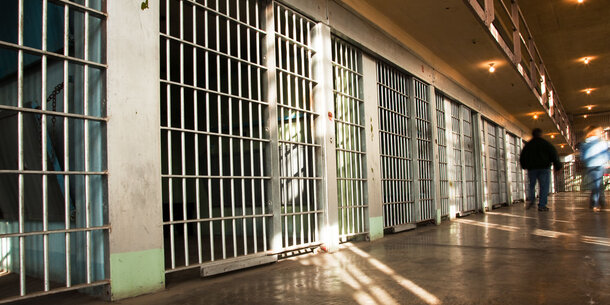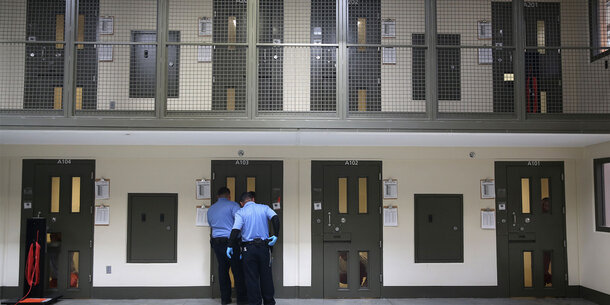Following George Floyd’s killing at the hands of law enforcement, millions have taken to the streets to demand a reckoning with our country’s deeply embedded racism. Under particular scrutiny are actors within the criminal justice system — namely the police and prosecutors. For the first time, the majority of white adults can see what countless Black people have known for decades: the criminal justice system treats Black people less fairly than white people.
In light of this reality and the many videos that have captured police violence against Black and brown people, Americans are calling for the “defunding” of law enforcement agencies and the reimagining of public safety, resulting in historic changes.
One outspoken critic of the criminal justice system has an insider’s view: Commonwealth’s Attorney Stephanie Morales of Portsmouth, Virginia. Morales recently participated in a discussion, moderated by Brendan Cox, director of policing strategies for the LEAD National Support Bureau, regarding calls for “defunding the police,” what community-driven policing looks like, and how the reallocation of government funds can improve community-led public safety strategies. The discussion was hosted by Law Enforcement Leaders to Reduce Crime & Incarceration (a project of the Brennan Center), a coalition group of which Morales is a member.
As far as Morales is concerned, she hopes to put herself out of work. She seeks to shrink the need for police, prosecutors, and the entire criminal justice system. Her remarks, edited for length and clarity, are presented here in an interview format.
Please tell us a bit about yourself.
Before I am a prosecutor, I am a Black woman. I am a mother of four Black children and a wife to a Black husband. As an individual, I have my own perspective on the harms that the criminal justice system perpetuates on communities — Black communities and communities of color. I cannot have any discussion on the issues plaguing our criminal-legal systems without first acknowledging that we are operating in a system of systemic racism — period.
You mention systemic racism — what is your view of the prosecutorial profession and its role in perpetuating racism?
My profession has caused harm. When we talk about systemic racism, we cannot remove the system actors from that equation. We have to acknowledge that, for years, prosecutors have perpetuated harms on Black communities and communities of color, poor and impoverished people, and LGBTQ+ communities. Police, prosecutors, judges, and other actors in the criminal legal system are part of perpetuating racism. We cannot talk about the overarching effects of the system without talking about the people who are a part of the system.
As a commonwealth’s attorney in Virginia, you are a system actor. What are you doing in your role to counteract systemic racism?
I try to take the restorative justice approach on a daily basis. I am constantly reminding myself and my peers that we are making decisions that impact people’s lives. We are handling matters similar to those in which George Floyd lost his life. Every single day, there is a footprint of the criminal legal system on people’s lives in ways that many of us cannot imagine. Our communities feel surveilled and oppressed at schools and in our neighborhoods — in neighborhoods where, quite frankly, individuals have no access to food, housing, and are at a total disadvantage.
On top of that, a group of 12 of us in Virginia formed an organization called the Virginia Progressive Prosecutors for Justice. We committed to advocating for laws in this special legislative session that we thought would protect the members of our community in the areas of police misconduct, mandatory minimum sentences, and more. We represent 42 percent of the population of the commonwealth of Virginia.
What does the “defund the police” movement mean to you?
Personally, I am an advocate of the defund movement, but we have to acknowledge what this is actually about. As a society, we must realize that we do not have unlimited resources. Too many of these resources are being taken up by mass incarceration and punitive policing. We do not have enough resources to provide mental health services, housing, and food security — to address the ills of society that are creating conditions in which members of my community, members of your community, are now engaging with this criminal legal system at a disproportionate rate. We have children in our communities that, if school is not in, they are not eating. We have extremely long waitlists for public housing. We have communities in public housing being heavily patrolled by law enforcement officers, producing a feeling among our young people that you are living in a police state.
The sentiment of wanting to defund the police is really about reinvesting in community, and in some cases, investing in poor Black and brown communities for the first time.
How would the defund the police movement impact your office and your work?
If the community wants to defund the police, that means that the entire criminal legal system will hopefully shrink. That means that my office will lose resources, and I am perfectly fine with that. If you are truly a person with a public servant’s heart, and you want to get this right, we should want to shrink this system. We should not want the footprint of this system on people’s lives. This is not the way it should be.
Do you believe it is challenging to discuss the defund the police movement?
I frequently wonder why we are having such a hard time talking about reallocation of funds and divesting to reinvest in something that will keep people out of the criminal legal system and decrease its footprint. It is not about taking away something from the police. It is about reinvesting and investing in communities to really create that opportunity for people, not just to live, but for communities to actually begin to thrive.
I welcome people to get comfortable with being uncomfortable, and to lean into this conversation. But, let us operate out of a place of respect for each other. We are finally having conversations that we have not had for too long. We need to figure this out together.
What are some of your greatest concerns with policing and law enforcement more broadly?
The way we determine who the system actors are going to be. Who are we entrusting with the role of becoming a public servant? When people are signing up for the police department, are police agencies seriously analyzing who is entering this role? Are we uncomfortable having a conversation about whether or not a potential officer is afraid of or doesn’t like Black people? Or afraid or disdainful of members of the LGBTQ+ community?
As the law enforcement profession, we cannot be uncomfortable having this conversation about how we select members who are going to serve our community. This is why communities don’t trust the police or prosecutors — because we do not engage in that discussion. We are failing to protect our community at the outset. We have not earned their trust.
What do you expect from fellow public officials in this moment?
If there is any elected official, public official, or anybody else who is in a public service position who at this point cannot feel — truly feel — and then profess that Black Lives Matter, I feel you are unfit to serve. When you are dealing with somebody who, quite frankly, does not value the lives of a subset of his or her constituency, I do not know what you can do to relate to that person other than to get them out. And that is really unfortunate.
Many elected officials are not activists and are not organizers. But I think the time has come now where we cannot afford to only be one thing. I cannot just be a prosecutor. I have to fully commit to being a public servant, which means I become an organizer, an activist, advocating for food security, against homelessness, and for policies to remove harm from the system.
Do you believe that the current system can be changed?
We have to transform. We have to dismantle and rebuild in a way that is going to enable us to serve our communities the way we are supposed to serve them. We have a responsibility now, as the ones who have a seat of power, to push for that transformative, non-incremental change at every turn. It is going to take everybody, from all different professions, to commit to doing this work and getting it right for us to see a change. We cannot just rely on things that we have tried before, like sensitivity, anti-bias, and de-escalation training. That does not remove the people who are racist. You cannot train the racism out of somebody who is a system actor.
The system is operating as it was designed to operate. So, we may not have a perfect solution, but we know that what is happening now is harmful. The current system is very disruptive in the lives of people on a daily basis. I am an advocate for defunding. It is not about taking away something from individuals. We need to invest in communities to really create the opportunity, not only for people to live, but for communities to actually begin to thrive and function in society. That is what the American dream is supposed to be — which some experience and others do not.






